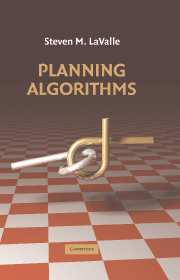Preface
Published online by Cambridge University Press: 21 August 2009
Summary
What is meant by “planning algorithms”?
Due to many exciting developments in the fields of robotics, artificial intelligence, and control theory, three topics that were once quite distinct are presently on a collision course. In robotics, motion planning was originally concerned with problems such as how to move a piano from one room to another in a house without hitting anything. The field has grown, however, to include complications such as uncertainties, multiple bodies, and dynamics. In artificial intelligence, planning originally meant a search for a sequence of logical operators or actions that transform an initial world state into a desired goal state. Presently, planning extends beyond this to include many decision-theoretic ideas such as Markov decision processes, imperfect state information, and game-theoretic equilibria. Although control theory has traditionally been concerned with issues such as stability, feedback, and optimality, there has been growing interest in designing algorithms that find feasible open-loop trajectories for nonlinear systems. In some of this work, the term “motion planning” has been applied, with a different interpretation from its use in robotics. Thus, even though each originally considered different problems, the fields of robotics, artificial intelligence, and control theory have expanded their scope to share an interesting common ground.
In this text, I use the term planning in a broad sense that encompasses this common ground. This does not, however, imply that the term is meant to cover everything important in the fields of robotics, artificial intelligence, and control theory.
- Type
- Chapter
- Information
- Planning Algorithms , pp. xi - xviPublisher: Cambridge University PressPrint publication year: 2006

